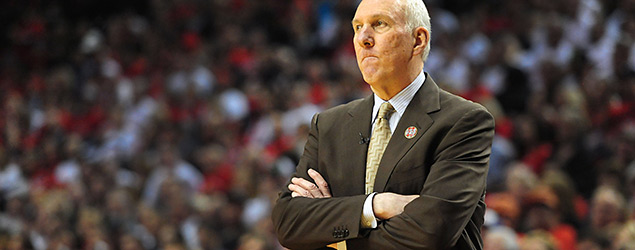
Gregg Popovich and the Spurs were eliminated by the Clippers in the first round of the Western Conference playoffs. (GETTY IMAGES)
Ask any basketball reporter and they will tell you their two greatest fears are being denied a free pregame meal and interviewing Gregg Popovich.
Popovich is undeniably one of the greatest coaches in NBA history. He helped build a model franchise in San Antonio, and he’ll likely find himself in the Naismith Basketball Hall of Fame some day.
Sure, he can be surly with the media because, let’s face it, winning five championships affords him that luxury.
Pop can play the role of Tywin Lannister better than anyone in the league. One bad question and you’re quickly sent to the chopping block. Just ask poor TNT sideline reporter Jaime Maggio when she had the unenviable task of trying to get more than five words out of the San Antonio Spurs coach.
In their in-game interviews, Maggio seemed like she couldn’t wait to get it over with as much as Pop.
Pop likes to poke the media for bad questions, and the media — for whatever reason — doesn’t poke him back even when Pop makes bad coaching decisions.
Pop isn’t immune to questionable moves. Remember Game 6 in the 2013 NBA Finals when he inexplicably took out Tim Duncan late in the game that allowed Chris Bosh to grab an offensive rebound and flip the ball to Ray Allen for a game-tying 3-pointer. The Heat went on to win Game 6 and eventually Game 7 to win back-to-back titles.
The poor-coaching bug hit Pop again in this year’s playoffs when he made several head-scratchers in the first-round series with the L.A. Clippers.
Let’s start with the hack-a-DeAndre-Jordan strategy.
It’s not a bad strategy to deploy, and it’s a momentum killer — we get it. But you can’t overuse it. It’s a get-out-of-jail card, which can only be good one time. Pop called for the hack-a-Jordan so many times TNT analyst Reggie Miller started shortening it to “hacka.”
Pop has repeatedly said he doesn’t like using the strategy, but it’s allowed in the rules so he’ll take full advantage until someone in the league decides to amend it. You can make a case either way whether the strategy works or not. Proponents say it works because you’re putting a sub-50 percent free throw shooter at the line and you remove the threat of the 3-point shot, especially when you’re ahead. However, opponents say the fouling strategy puts teams in the bonus a lot quicker, making it tougher to play defense without fouling. And it also stymies your own flow on offense.
What Pop and the Spurs coaching staff fell asleep on was the poor decision to use some of Tim Duncan’s fouls on hack-a-Jordan. Duncan is the most valuable Spur, so you don’t want to waste his fouls on silly fouls. But yet there was Duncan, hugging Jordan time after time, putting him in foul trouble in at least three of the seven games in the series. Why not send Matt Bonner or Aron Baynes to commit hack-a-Jordan?
Speaking of Baynes, Popovich’s decision to assign him to Clippers All-Star forward Blake Griffin in Game 1 led to a Clipper blowout. Griffin dunked on Baynes so hard twice the Spurs backup center lost an “r” in his first name. Baynes never saw Griffin again for the rest of the series.
But Popovich saved his most egregious error in the final moments of Game 7 when he chose to have Danny Green guard Chris Paul instead of Defensive Player of the Year Kawhi Leonard. As it played out, Paul beat Green going to his right and banked in the game-winning shot with one second left to eliminate the Spurs in the playoffs.
Green is a capable defender, and he’s had some success against CP3. But when you have the best one-on-one defender in the NBA, don’t you want to stick him on Chris Paul? Would love to find an answer from Pop, but the media is too scared to ask him that question.
Joel Huerto is editor and publisher of OneManFastBreak.net. Follow him on Twitter @onemanfastbreak.